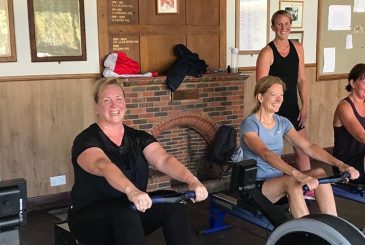Whether you’re looking to increase the number of miles you row each week or striving for a new 2km PB, it is important to have the correct nutrition to support your training. This article will briefly discuss what you should eat on a day-to-day basis, as well as before and after training to remain healthy and optimise your training sessions.
Fuel with Carbohydrates
Carbohydrates are an important source of energy and should be consumed before exercise in order to train for the duration of a session with the correct intensity. In general, a pre-exercise meal should be consumed about 3-4 hours before exercise and ideally contain slower release, also knows as lower glycaemic index (GI), carbohydrates. Lower GI carbohydrate take longer for the body to digest and therefore provide energy over a longer period of time. They are typically found in foods such as oats, sweet potato and wholegrain bread and basmati rice. A small snack could be consumed about one hour before exercise which could contain some higher GI carbohydrate.
Examples of Pre-Exercise Meals and Snacks
| Meal | Snack |
|---|---|
| Porridge | Banana |
| Granola with fruit and yoghurt | Cereal bar |
| Jacket sweet potato with tuna | Homemade flapjack |
| Wholemeal wrap with chicken | Peanut butter and jam on toast |
Recover with Protein
Proteins are part of every cell and tissue in the body, including our muscles. They are made up of twenty-one amino acids, of which nine are essential amino acids and can only be obtained through the diet. The essential amino-acids can be found in plentiful amounts in animal-based products such as meat, poultry and dairy. Those following a plant-based diet should combine different sources of protein throughout the day to achieve the correct balance of essential amino acids as plant foods provide a more limited supply.
Protein plays a role in optimising muscle adaptations and supporting recovery following exercise. As soon as possible after exercise, aim to have a snack or meal containing at least 20-40g of high-quality protein combined with a source of carbohydrate. Not only will this help repair the muscles, but it will also aid in replenishing energy stores.
Examples of Meals and Snacks Containing 20g of Protein and ~50g of Carbohydrate
| Meal or snack | Portion size |
|---|---|
| Milk and a banana | 1 pint of milk and 1 small banana |
| Rice cakes topped with cottage cheese and cucumber & a glass of orange juice | 3 rice cakes, 4tbsp cottage cheese & tall glass of orange juice |
| Muesli with Greek yoghurt and berries | 60g muesli, 150g Greek yoghurt and 2 large handfuls of frozen berries |
| Scrambled eggs on toast | 3 eggs and 2 slices of wholemeal toast |
| Chicken with rice & vegetables | 1 chicken breast, 70g rice and 2 large handfuls of vegetables |
Choose Healthier Fats
Fats not only play a role in providing energy, but they are also needed to absorb fat-soluble vitamins, tissue health and to help the brain to function. However, some fats are more beneficial than others. Foods containing saturated fat such as butter and fatty cuts of meat, should be consumed in small amounts. Instead, opt for healthier unsaturated fats, which are typically found in avocados and almonds, as well as omega-3 fatty acids found in oily fish.
Clinical research demonstrates that omega-3 may help prevent diabetes, cardiovascular disease and strokes due to their anti-inflammatory properties and influence on the immune system. Regarding exercise, omega-3 fats can aid muscle recovery, support the immune system and improve cognitive function. The best sources of omega-3 are found in oily fish such as salmon, mackerel and sardines which should be consumed at least once a week. They can also be found in plant-based sources such as chia seeds, flaxseeds and walnuts.
Support your Immune System
As a minimum, try to have at least five portions of fruit and veg per day. Eating more fruit and veg throughout the day can easily be achieved. Firstly, look to include a portion of fruit with breakfast. This could mean topping your porridge with dried fruit or a banana. Secondly, make sure there is plenty of colour on your plate during lunch and dinner. Lastly, have at least one piece of fruit or some vegetables as a snack each day. This could include snacks such as a fruit salad or carrot sticks with hummus.
Stay Hydrated
Hydration is crucial for good health and to keep our bodies performing at their best. As a rough guide, aim to have at least two litres of fluid per day which can include water, fruit juice, tea and coffee. Remember your fluid needs will not always be the same each day; on warmer days or days you exercise you will need to drink more to replace the fluid you lose through sweat. The easiest way to remain hydrated is to sip on water throughout the day. Other good habits include having a pint of water when you wake up and alongside every meal, as well as carrying a water bottle around with you.
Conclusion
Getting fitter requires more than just an intense training regime; it also requires a well-balanced diet to help the body adapt. Turning up to training well hydrated and fuelled will help with concentration levels and improve the quality of your training session. Following a training session, consuming a balanced meal, containing carbohydrates, protein and vegetables, will help your muscles recover, replenish energy stores and support your immune system. In the long run, forming simple nutritional habits around your training can significantly enhance the quality of your sessions and ultimately improve your fitness










